Types of driveway materials and their pros and cons, according to landscaping experts
Explore the different types of driveway materials available on the market today so you can make the right choice
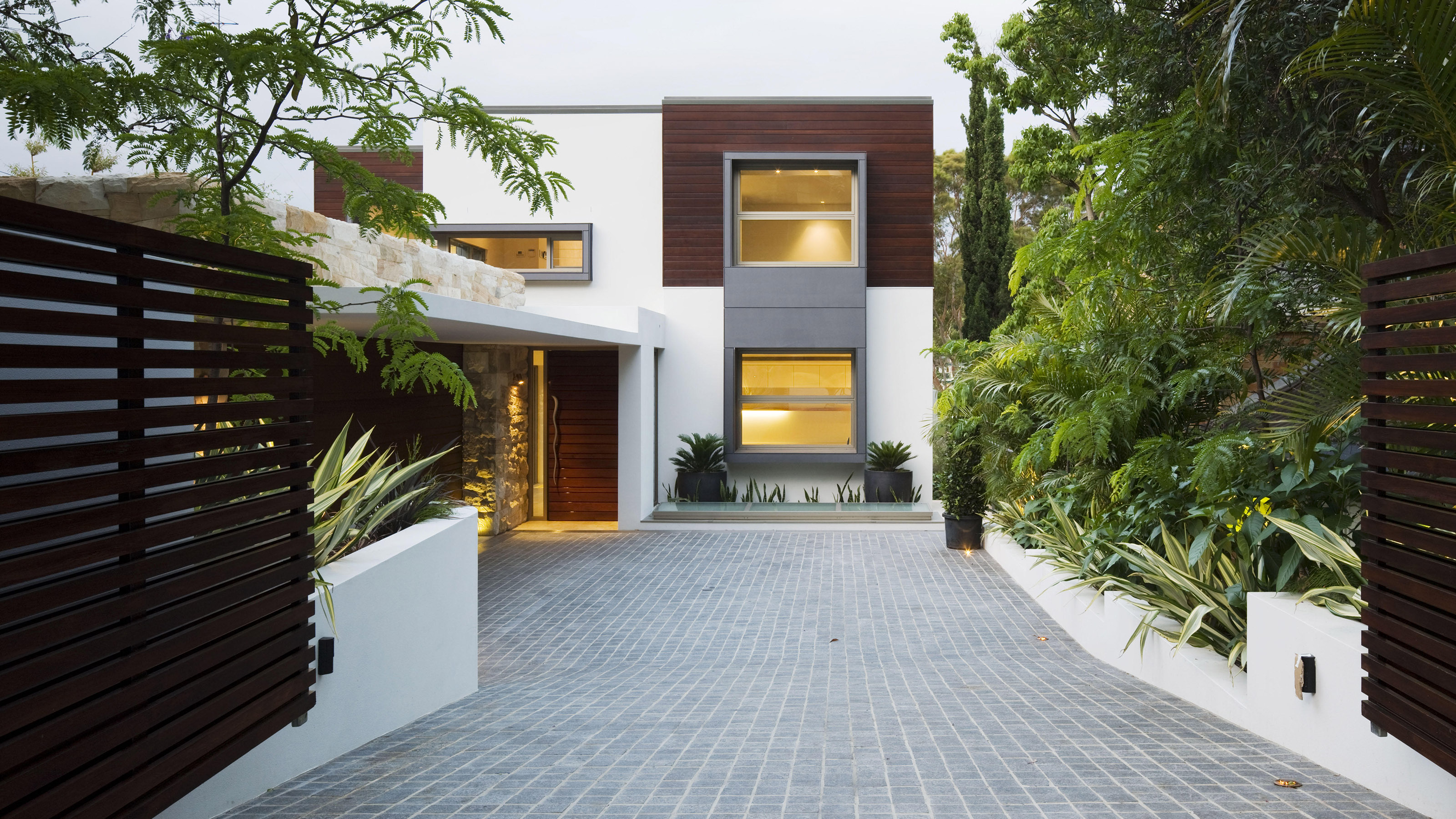

Unlike some of our backyard spaces, all types of driveway serve a real practical purpose which means the materials we use require careful consideration.
When it comes to making any decision which has significant practical considerations as well as fairly large cost implications, it's important that you do your research on costs, durability, aesthetics and installation requirements.
Another fact that I find is too often overlooked is how much maintenance is required. Some driveway materials which tick the price and style boxes might seem like a no-brainer at first, but if you need to be out there jet washing and replacing slabs in a couple of years then this could be a bit of a false economy.
If you think there's a good chance that you might be selling your house and moving in a few years, this might also be something to take into account with your choice and you should pick driveway materials which will appeal to a broad market.
And for some of us, environmental impact will be a sticking point. So you'll want to be aware of the carbon footprint attached to your chosen material.
Whatever types of materials your considering for your driveway ideas, just make sure you are aware of all these factors ahead of time so you can be sure you find the perfect fit for your space.
Get in the know with our guide to types of driveway materials
When considering the different types of driveway materials it's always best to choose ones which are recommended by people who know what they're talking about.
That's not to say you can't install a driveway yourself of course, but unlike a garden path or patio, your driveway materials need to safely hold the weight of your vehicle without subsidence or flooding.
Anna Hampshire, Head of Domestic Marketing, at Marshalls says: 'Most domestic driveways are designed for domestic traffic for vehicles no heavier than 7.5 tons and strictly no commercial vehicles; we would recommend seeking technical advice if you are going to be parking heavier vehicles on it as the sub-base will need to be increased.'
With that in mind, we've rounded up the best types of driveway materials for budgets big and small.
1. Concrete
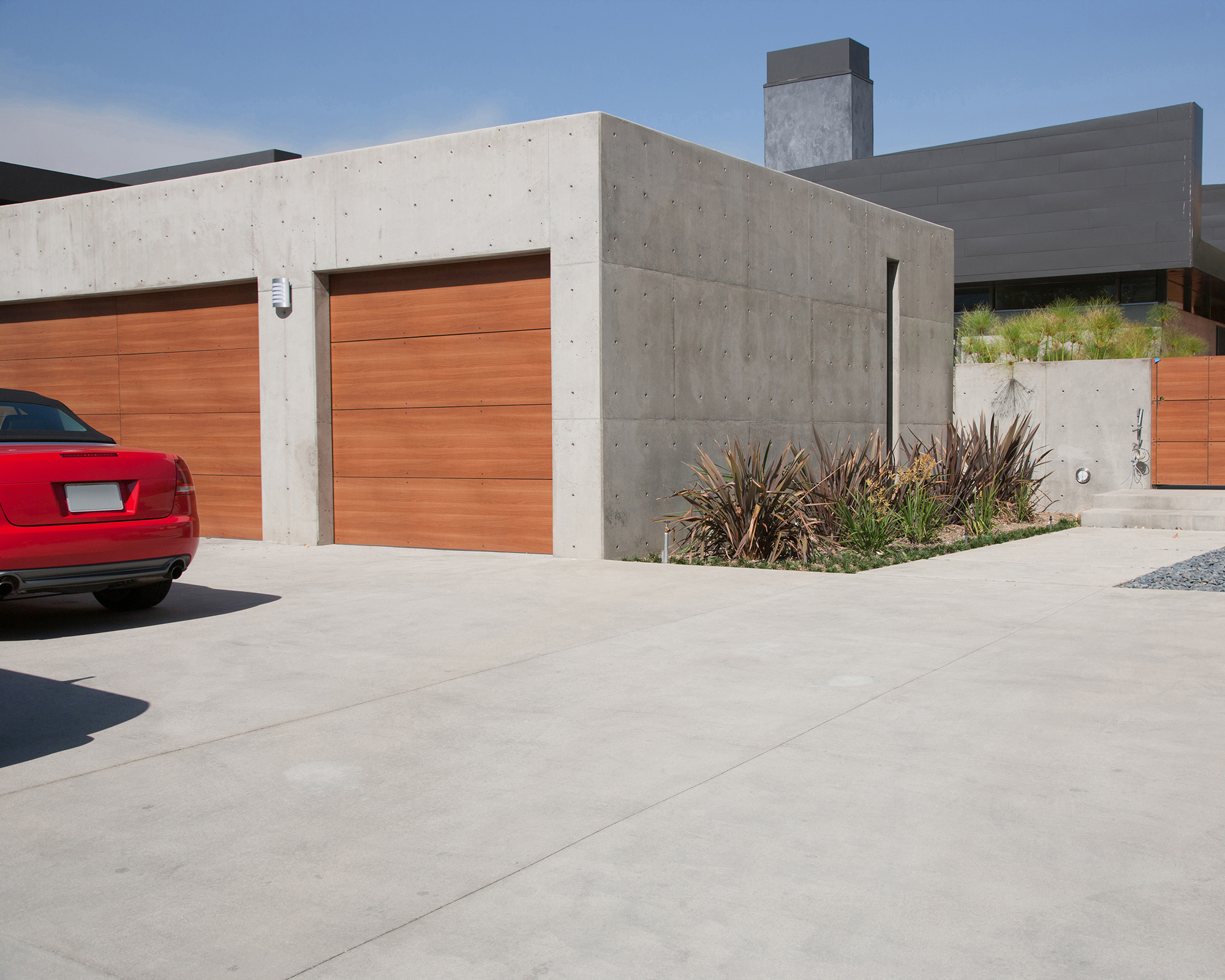
Concrete driveways are extremely durable and can be a great option for a more modern-looking scheme. From an aesthetic point of view, you can't really go wrong with concrete for front yard landscaping as it's quite inoffensive but perhaps wouldn't be winning any prizes for ornate beauty.
Color wise, Thomas Goodman, property and construction expert at MyJobQuote says: 'Concrete driveways are most commonly grey. However, some companies may offer colored concrete driveways. These tend to come in natural colors such as shades of brown, sandy beige, and other earth tones.'
And how does the price compare to other types of driveway materials? 'The average cost of a concrete driveway varies immensely depending on the size of the driveway and your location in the world. But, 'concrete driveways are one of the cheapest options when it comes to driveway materials,' according to Thomas.
To maintain a concrete driveway you'll need to regularly seal it and any damaged areas will need to be repaired as soon as possible.
In terms of environmental factors, a major component of concrete is cement and the cement industry is a producer of carbon dioxide. You'll also need to think about water drainage. 'Concrete creates a hard surface that contributes to water runoff that may cause flooding, soil erosion or water pollution if the right kind of drainage isn't put in place,' says Thomas.
Pros of using concrete driveways
- Concrete is an affordable option when you consider the longevity
- It is very durable
- Option for a range of colors
Cons of concrete driveways
- Not always the most attractive building material
- Requires regular maintenance
- Not very DIY-friendly
2. Block paving
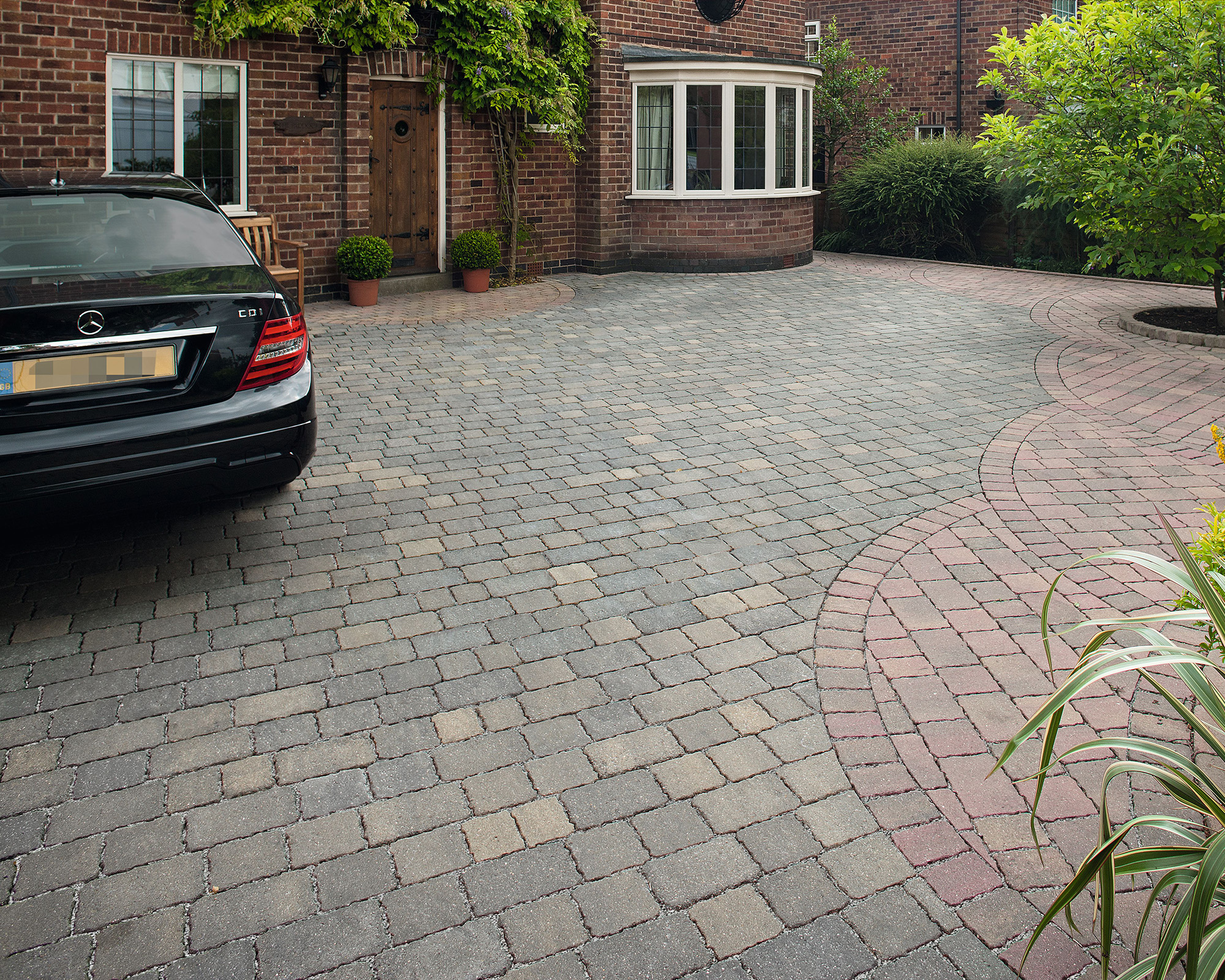
Drivesett Tegula Priora® from Marshalls is an example of permeable block paving
Block paving is a good choice if you fancy laying your driveway yourself. It can be installed as a DIY job as there are no special tools or equipment needed. Block paving can be quite durable, and the gaps in the pavers allow any weight to be spread evenly and safely.
According to Thomas Goodman however, 'when it comes to freezing temperatures, water can freeze between the cracks, resulting in the pavers becoming dislodged or separated.' You can try and avoid this by ensuring that the gaps between pavers are well filled.
'You will need to add a drainage system with a block paving driveway as typically it is not a permeable material and water needs to run away from the driveway safely,' says Thomas. 'However, using permeable block paving stones can help to ensure that your driveway is environmentally friendly.'
Block paving comes in a bigger range of colors than concrete, and more visual interest can be added by using different sizes and shapes to create patterns.
Pros of block paving driveways
- Creates distinctive and interesting designs
- Attractive finish
- No curing period required
- Less slippery than concrete driveways
- Great for sloped driveways
- Unlikely to crack
Cons of block paving driveways
- It takes longer to install than many other driveways
- Not great with the freeze and thaw cycle as water seeps through the gaps and freezes
- Snow, debris and leaves can get trapped in the cracks
- Additional drainage is usually required
3. Tarmac and asphalt
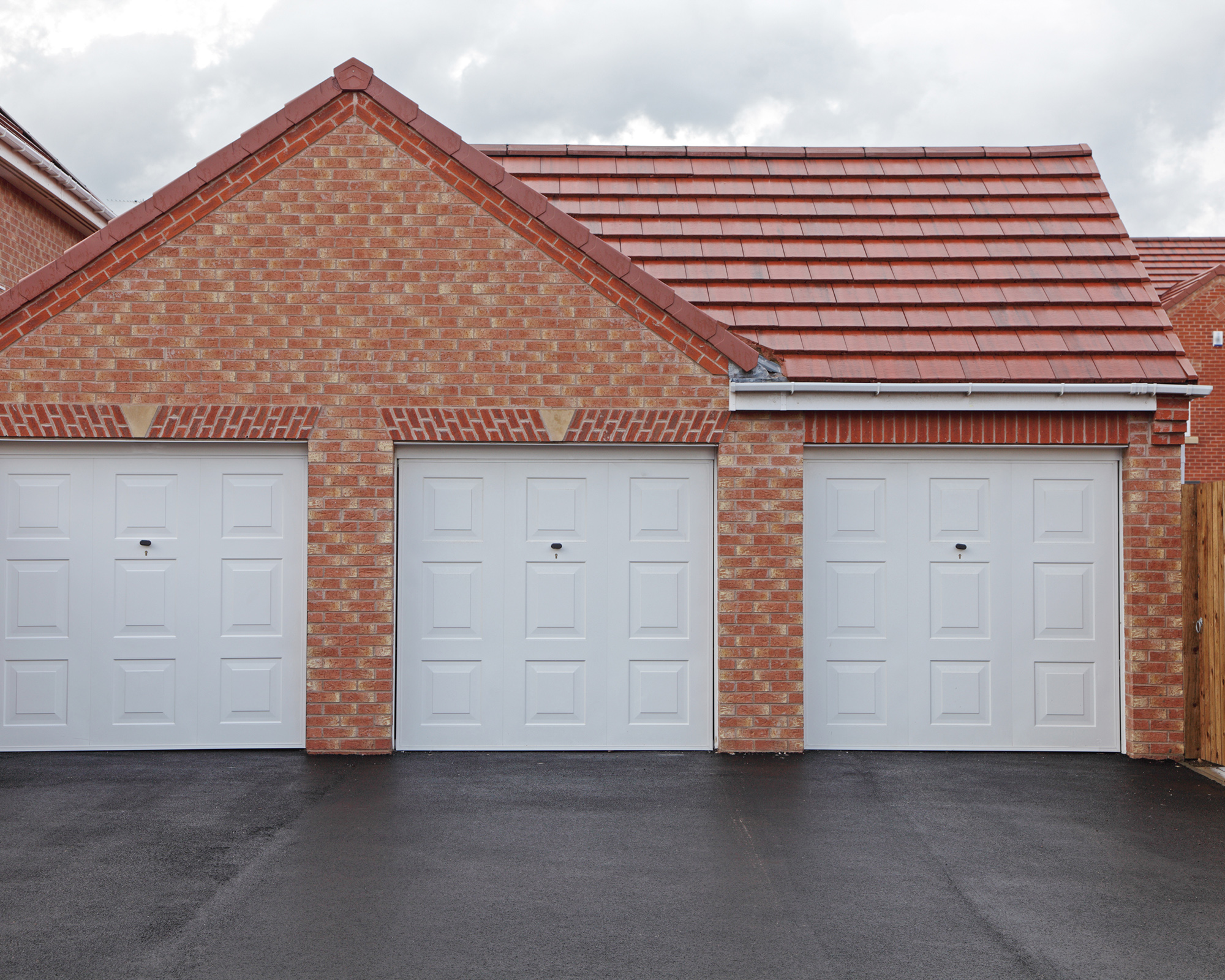
Tarmac has serious environmental considerations as a driveway material
If you're looking for budget driveway ideas, these materials are affordable, durable, and can last for around 15 years without requiring any maintenance. But there are serious environmental considerations that those of us who are fans of sustainable gardens ought to be aware of.
High temperatures are needed to create tarmac and asphalt which release harmful chemicals into the environment. But these emissions can continue even after tarmac and asphalt is laid. A study by Science Advances on Asphalt-related emissions showed that warmer temperatures can cause asphalt to create harmful emissions which contribute to air pollution. Something to consider if you live in a climate with warm summers, for example.
Thomas Goodman told us that water run off can be harmful too: 'When water drains from the tarmac, it can cause pollution if the drainage goes into nearby rivers.'
Pros of tarmac and asphalt driveways
- Neat driveway surface
- Extremely durable
- Quick to install
Cons of tarmac and asphalt driveways
- Bad for the environment
- Not great if you need to still-turn your tyres
- No color options
- Can get really hot in the summer
4. Porcelain paving
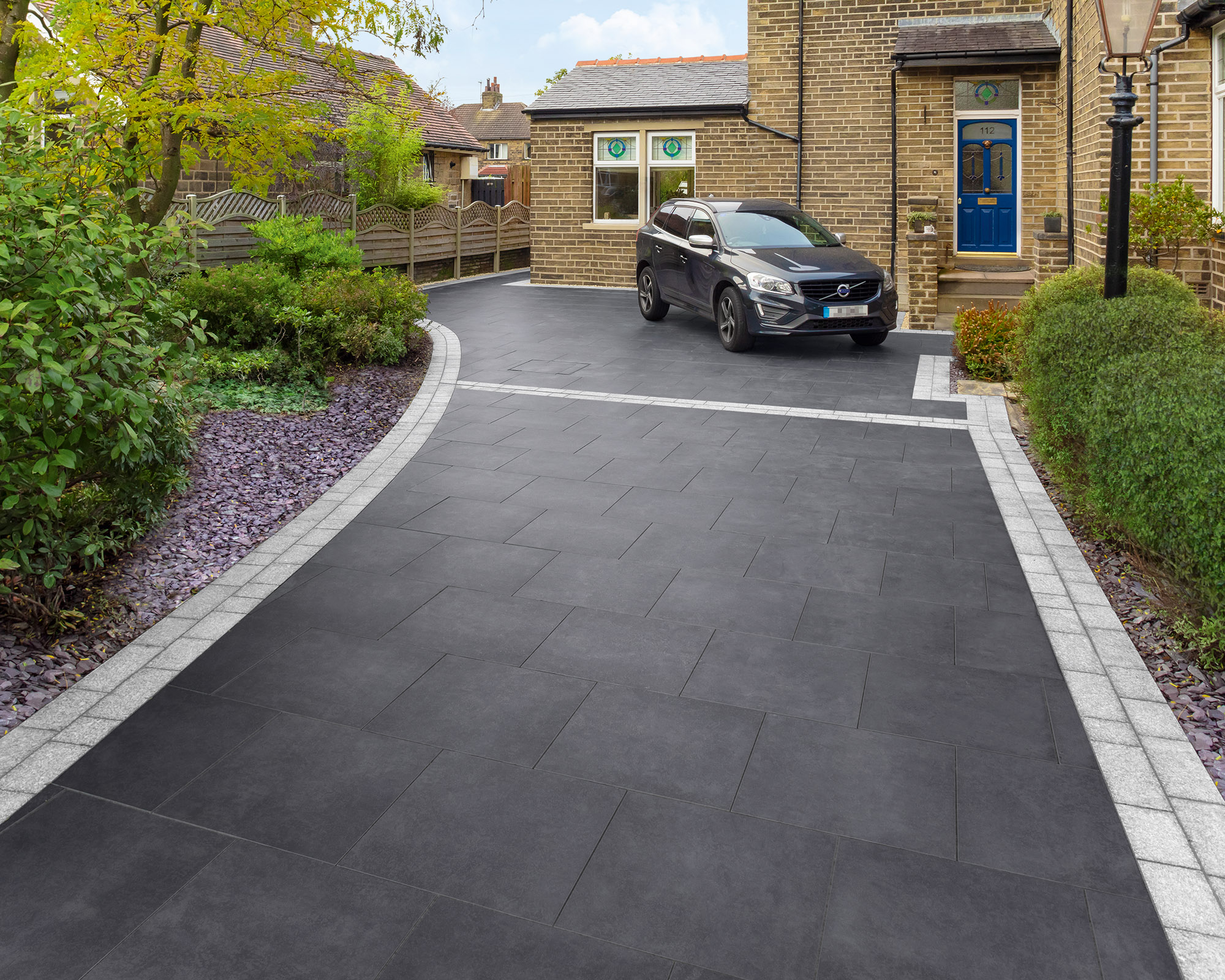
SYMPHONY® Plus Driveway from Marshalls is made from concrete-backed porcelain
Porcelain is one of the more expensive driveway options but it's considered an attractive modern paving idea. According to Anna Hampshire, Head of Domestic Marketing at Marshalls : 'The benefits of porcelain for an outdoor space are that it looks modern and is very low maintenance due to the low level of water absorption. Because of this, porcelain will attract less algae, be more stain resistant and be less slippy in colder weather.'
Porcelain driveways are relatively new to the market, and in the case of some products they are concrete backed to make them incredibly strong and durable. Another benefit is that it can be installed much quicker than other products as it is laid on a flexible bed.
When it comes to how to clean a driveway made from porcelain tiles, all it needs is a regular jet wash with the best pressure washer. Or you can clean by hand, says Thomas Goodman. 'Sweep dirt and debris away with a brush, cover the tiles with water and pH neutral cleaning solution. Allow this to stand for around 5-10 minutes. Use a scrub brush to scrub the paving stones to get rid of stains, then wipe away the cleaning solution and rinse the area with clean water.'
Pros of porcelain paving driveways
- Resistant to moisture damage
- Easy to maintain
- Relatively easy to install
Cons of porcelain paving driveways
- Higher in cost than many other driveway materials
- Difficult to cut
- Unique appearance may not appeal to everyone
5. Resin bound
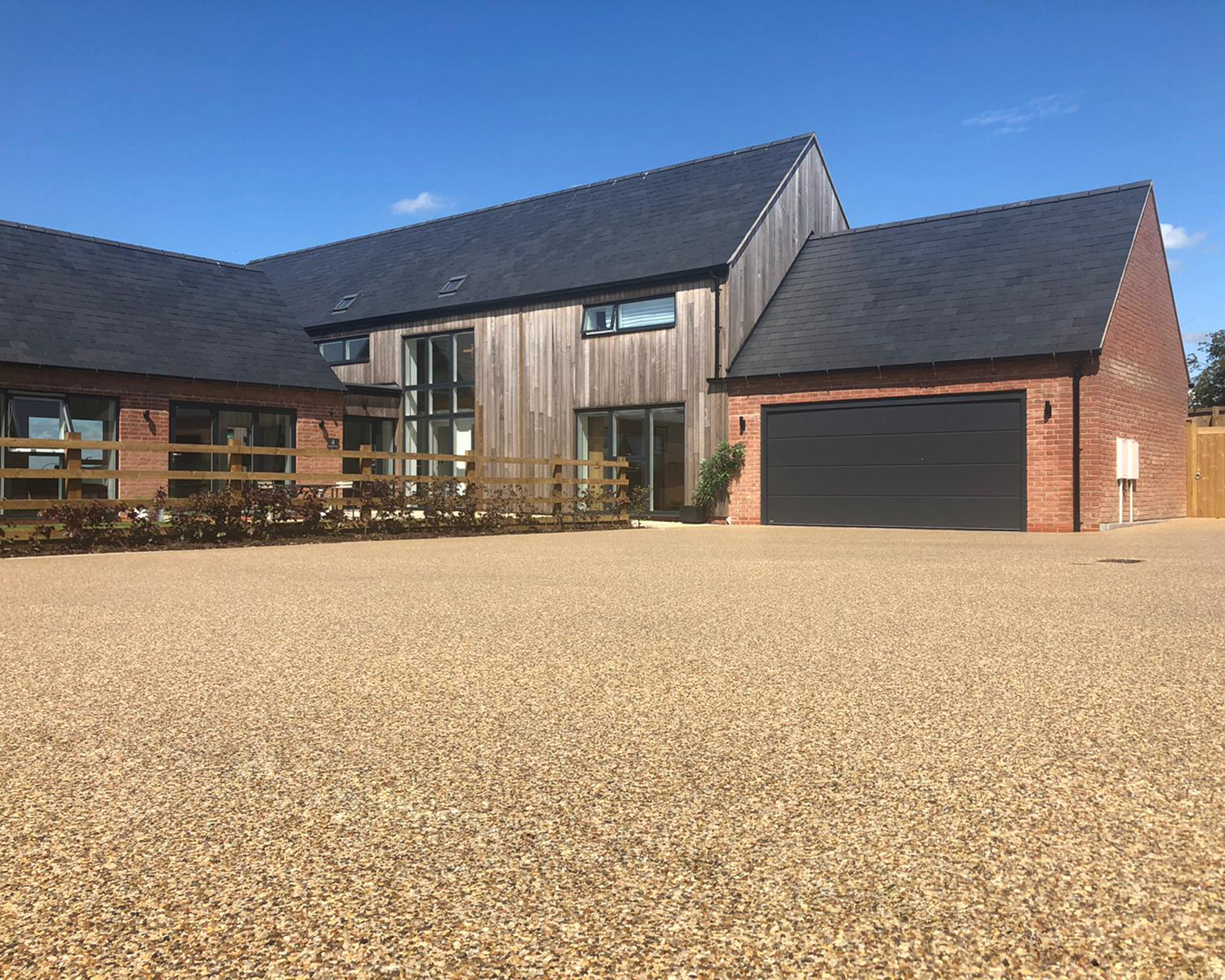
Resin bound driveways are becoming more and more popular with homeowners and house builders according to HMS Specialist Surfacing
Resin Bound is a surface solution that involves a hard-wearing course of resin mixed with clean, dried, decorative aggregates. This is hand trowelled onto a new or existing base.
Resin bound paving is extremely hard wearing. Laura Wilson, Contracts Manager at HMS Decorative Surfacing says: 'SUDS (sustainable drainage systems) compliant resin bound paving features a specialist ‘honeycomb’ structure within its composition which allows water and air to pass through seamlessly, whilst maintaining incredible strength and slip resistance simultaneously.'
Some resin bound aggregate products, like the Decra®Set stone binder from HMS Decorative Surfacing, are non-toxic and manufactured using by-produced organic materials to reduce their environmental impact as far as possible. Most resin bound aggregates are made from natural materials.
Style-wise, resin-bound driveways come in a range of colors and designs to suit your specific requirements. You can choose from solid or mixed colors.
In terms of cost, these types of driveways aren't too expensive, however you will need to factor in the cost of preparing a base.
Pros of resin bound driveways
- Low cost
- Quick to install
- Easy to maintain
- Good drainage
- Durable
- Variety of design choices
- Made from natural and sustainable materials
Cons of resin bound driveways
- Colors may fade
- Moss and weed growth is possible
- Stains can occur
6. Stone Pavers
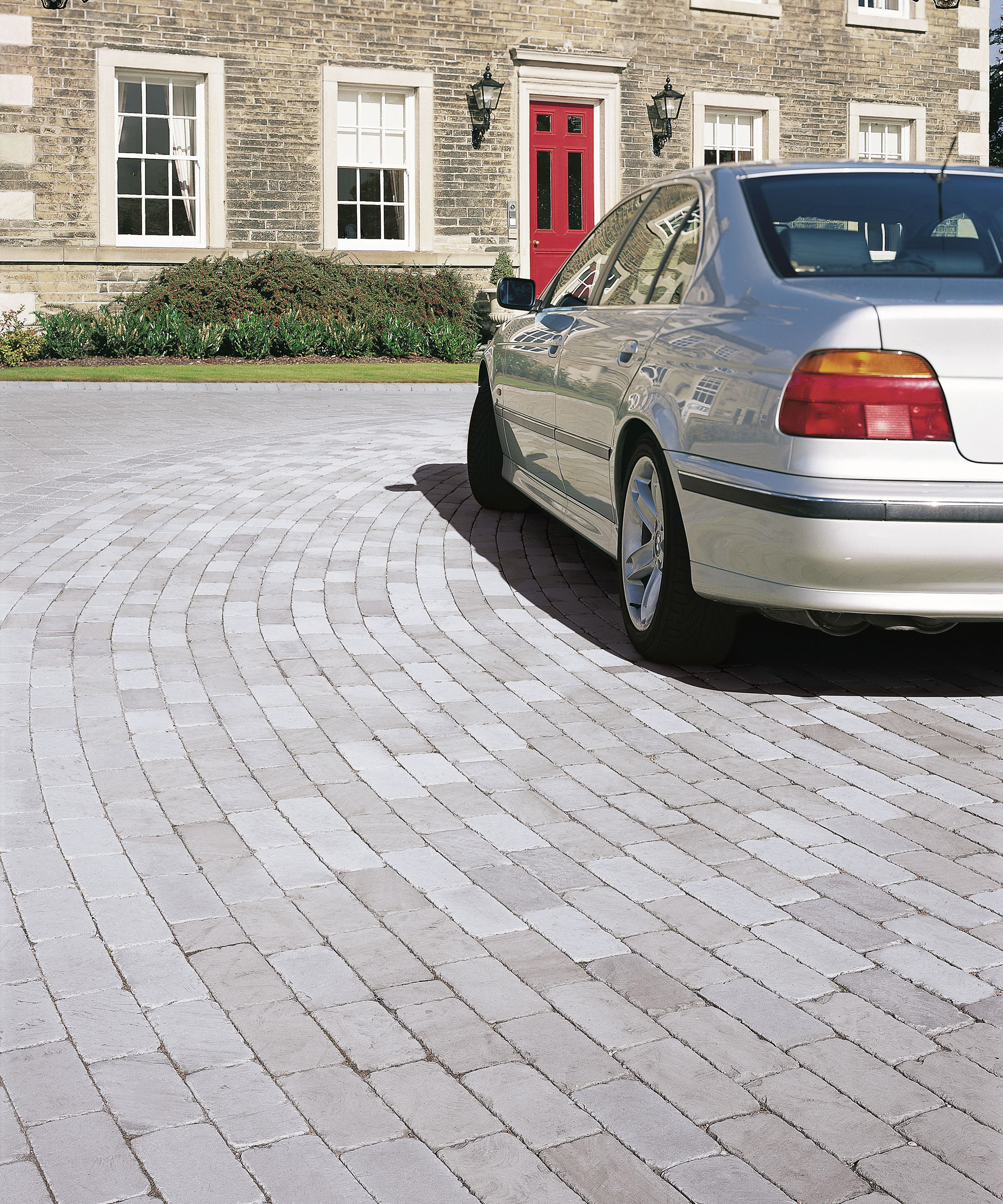
Fairstone sawn granite setts from Marshalls are used in this driveway
Natural stone is a classic choice for a driveway or patio which can be enhanced by combining with other rustic finishes such as your driveway gate or a fence. When it comes to natural stone, there are a range of choices depending on color and finish preference. 'You could choose sawn granite in grey for a modern finish, or Indian sandstone in creams that has been tumbled to give it more of a classic finish,' says Anna Hampshire from Marshalls.
Stone paver driveways are made from natural materials, however it’s important to check it has been sourced ethically and meets minimum standards in terms of water absorption and strength. Sourcing locally will also reduce air miles attached to your driveway project.
'If you're thinking about the environment it's important to have an appropriate and effective driveway drainage system in place to ensure flooding doesn’t occur and to ensure nearby soil isn’t ruined,' says Thomas Goodman.
You'll find that stone pavers will need regular weeding between the cracks, however there are tried and tested methods on how to get rid of weeds and stop them from spreading which can be applied here.
Pros of stone paver driveways
- No curing time
- Various design options
- The surface is permeable
Cons of stone paver driveways
- Can be expensive
- Weeds can come through the cracks
7. Gravel
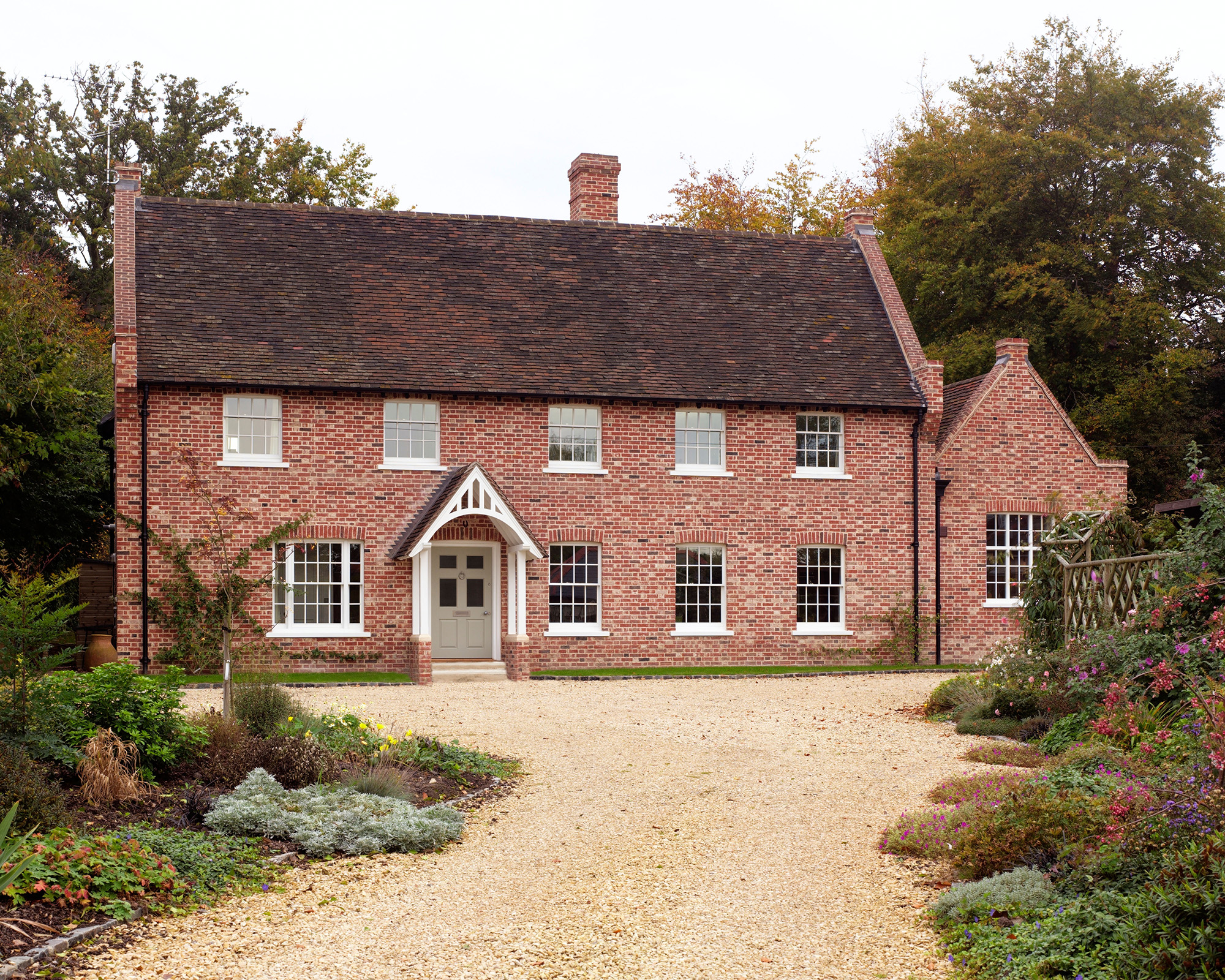
Gravel driveways are rustic and produce a satisfying crunching noise
'Gravel driveways are a bit easier and quicker to install, so if you’re looking for faster installation, this could be the option to go with,' says Adam Birch of Birch Landscapes.
And for their price, they're quite durable and can last for decades with the right maintenance. This involves applying top up layers every two to three years and more often if holes appear.
Environmentally speaking avoid gravel which has been strip-mined from the sea bed, and look for recycled aggregates like crushed concrete and brick. This means that energy and resources aren't being used to make new products and rather use that which is already there.
'Whilst gravel driveways are good for low maintenance landscaping, they will require spraying of weedkillers to reduce the likelihood of them growing through,' says Adam, 'and it's worth noting that gravel is not a recommended option if your driveway is sloped.'
Also if you live in an area that gets a lot of snowfall you might want to bear in mind that it is quite tricky to remove snow from a gravel patio or driveway.
Pros of gravel driveways
- Low cost
- Easy to maintain
- Good for drainage
- Gravel can be replenished
- Easy to repair
- Various colors
Cons of gravel driveways
- Weeds can grow in the gravel
- Gravel can wash away
- Not a premium driveway material
- Develops potholes
- Difficult to remove snow
8. Reinforced Grass Paving
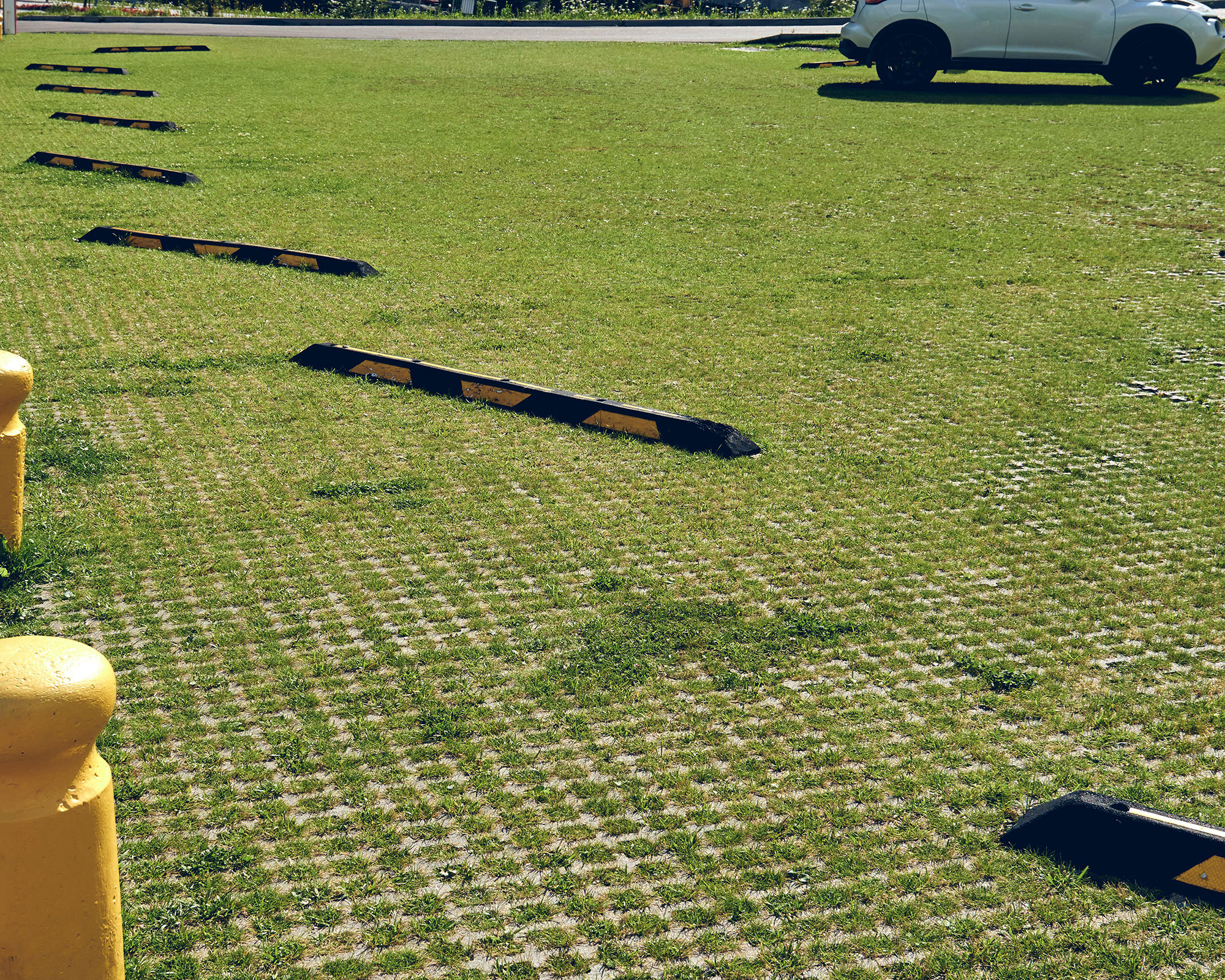
These types of driveway consist of layers of gravel and sand and reinforced grass blocks with topsoil and grass seed then planted on top.
'A reinforced grass driveway is one of the most environmentally-friendly driveway types you can get,' says Thomas Goodman. 'The grass is natural, and the surface provides plenty of drainage.'
However as gardeners we know how much water it takes to keep grass looking green and using an excess of water can be harmful to the environment. So keep in mind garden water saving tips such as allowing your grass to grow long to keep moisture in.
'Reinforced grass driveways can be quite durable,' adds Thomas. 'However, it’s important to remember that it is grass, so some areas that are driven over regularly may become flattened.'
Pros of reinforced grass driveways
- Reduced stormwater runoff
- Returns water to the earth
- Porous pavers keep the driveway cool
- Environmentally-friendly
- Attractive green finish
Cons of reinforced grass driveways
- Weeds can form easily
- It can be quite expensive
- Not as long-lasting as many other driveway types
- The surface can be quite bumpy
- Requires mowing and maintenance
9. Stone Setts
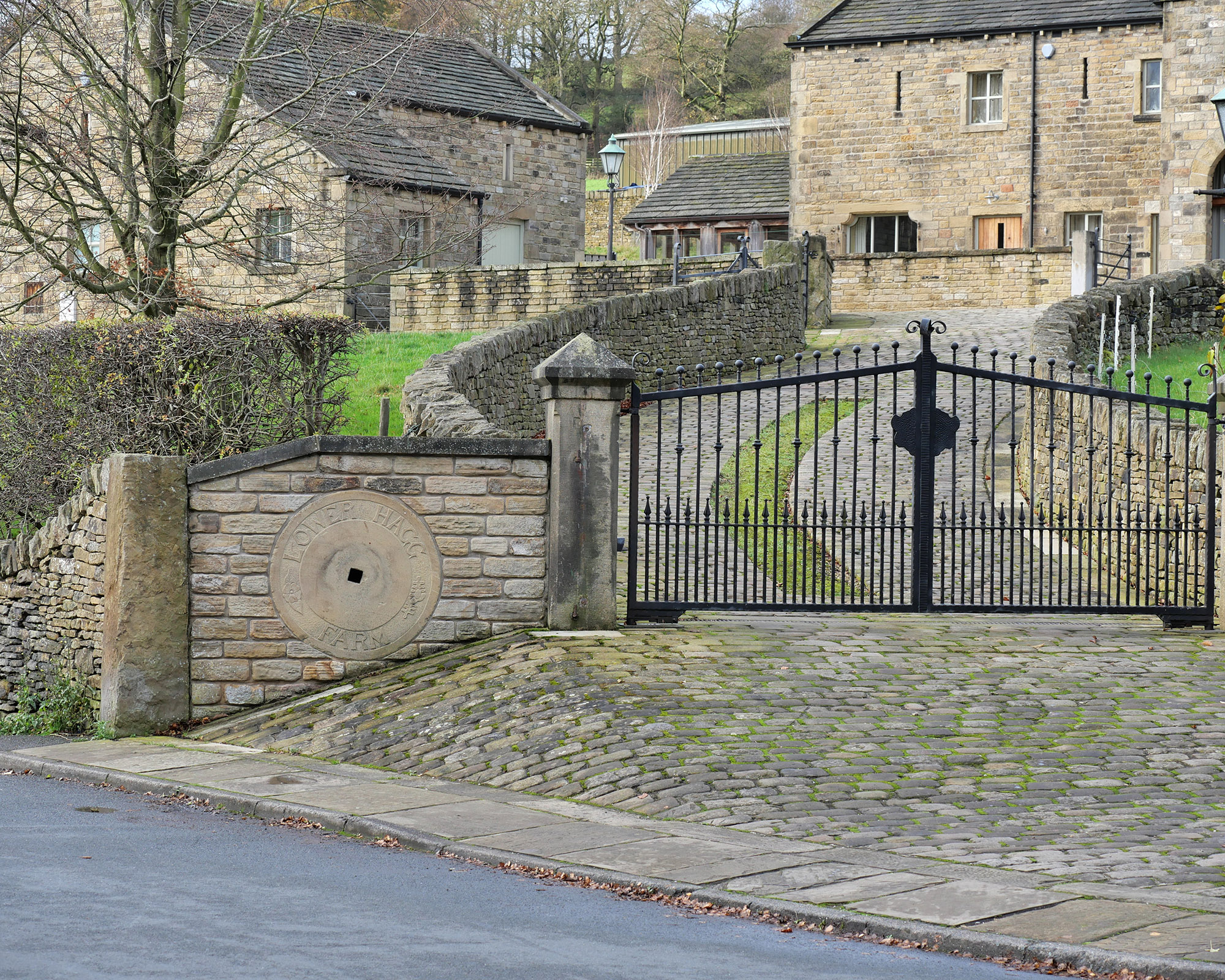
Stone sett driveways are extremely durable
Stone setts make characterful driveway materials. Rowan Cripps of Infinite Paving recommends stone cobbles as probably the best to use on driveways due to their durability and capacity to hold weight without cracking. He particularly favors Indian sandstone cobbles.
'They are totally durable and safe for driveways as they can withstand different kinds of pressure including extreme hot and cold weather. Furthermore, the material is solid which means it is unlikely to split or crack and should withstand years of heavy cars driving over it.'
Stone setts come in a good range of colors and they can be laid in ornate patterns to give even more visual interest. Keep them in tip top condition by replacing any loose stones as soon as possible (it's a very good idea to keep a stock of leftover setts for precisely this reason).
'Stone sett driveways need to have an appropriate drainage system installed,' says Thomas Goodman. 'The materials are mostly all-natural. However, as with all manufactured material, the manufacturing process may have an impact on the environment.'
Pros of stone sett driveways
- Range of design choices
- Durable and long-lasting
- Low maintenance
- Extra strong for driveways with high traffic
Cons of stone sett driveways
- Expensive
- Difficult to install
- Stones can become loose and cause tripping hazards
10. Brick
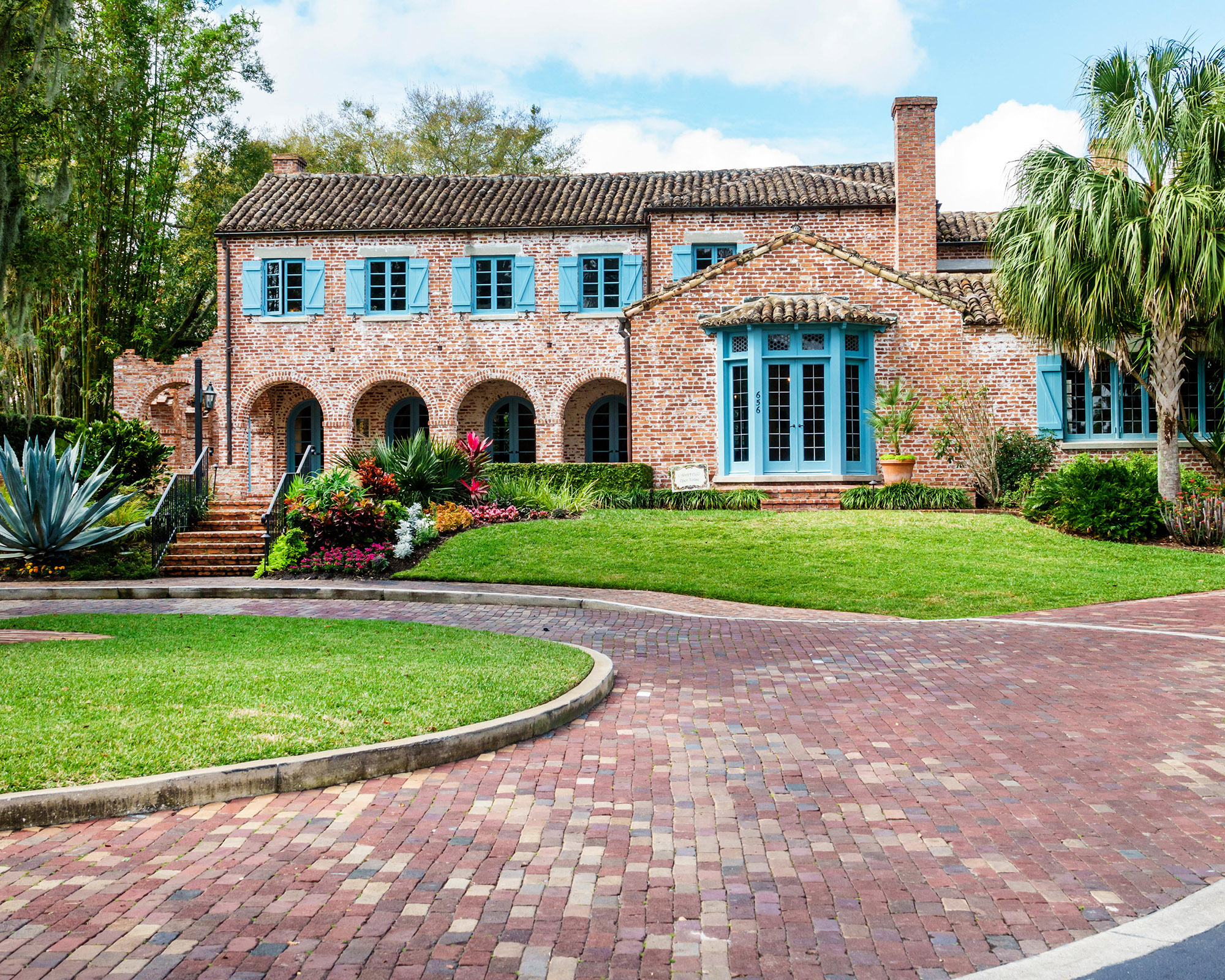
Try sourcing reclaimed brick for your driveway
Bricks have an attractive finish and you often see them used as attractive garden path ideas. But they're also very durable when used as driveway materials. According to Thomas Goodman the average brick driveway will last for around 25 years.
Bricks only come in certain shades, however very different looks can be created even with a fairly limited pallet. Grey bricks could look cool and contemporary for a modern garden, whereas red bricks are more traditional and could suit a cottage garden scheme.
'Bricks are recyclable, and the production process produces relatively low emissions,' says Thomas. Before you buy new see if there are any reclaimed bricks you can use, which will have an even lower carbon footprint. Bricks aren't permeable however, so if you're using them you will need to ensure you have a good drainage system in place.
Cost-wise you can consider bricks to be a 'medium-priced driveway in comparison to other driveway types,' adds Thomas.
Pros of brick driveways
- Attractive finish
- Durable material
- Easy to repair
- Recyclable
Cons of brick driveways
- Can be expensive
- Requires sealing regularly
- Difficult to install
- Susceptible to frost heaving
What is the most cost effective driveway material?
Every project is different depending on the size, products chosen for installation and the end use of the driveway.
Jamie Gledhill, Engineering Technical Manager for Brett Landscaping says: 'As the most established system with the widest choice of products concrete block paving can be bought in greater quantities at a lower cost. Natural stone costs more, and porcelain systems are at the high end of market. However, using hybrid porcelain systems can bring the outlay down significantly even against permeable paving.
'A hidden cost will be any drainage that needs to be installed separately - which will include digging out, installation and providing a runoff for water to drain away. This is less of a factor when using concrete block permeable paving.'
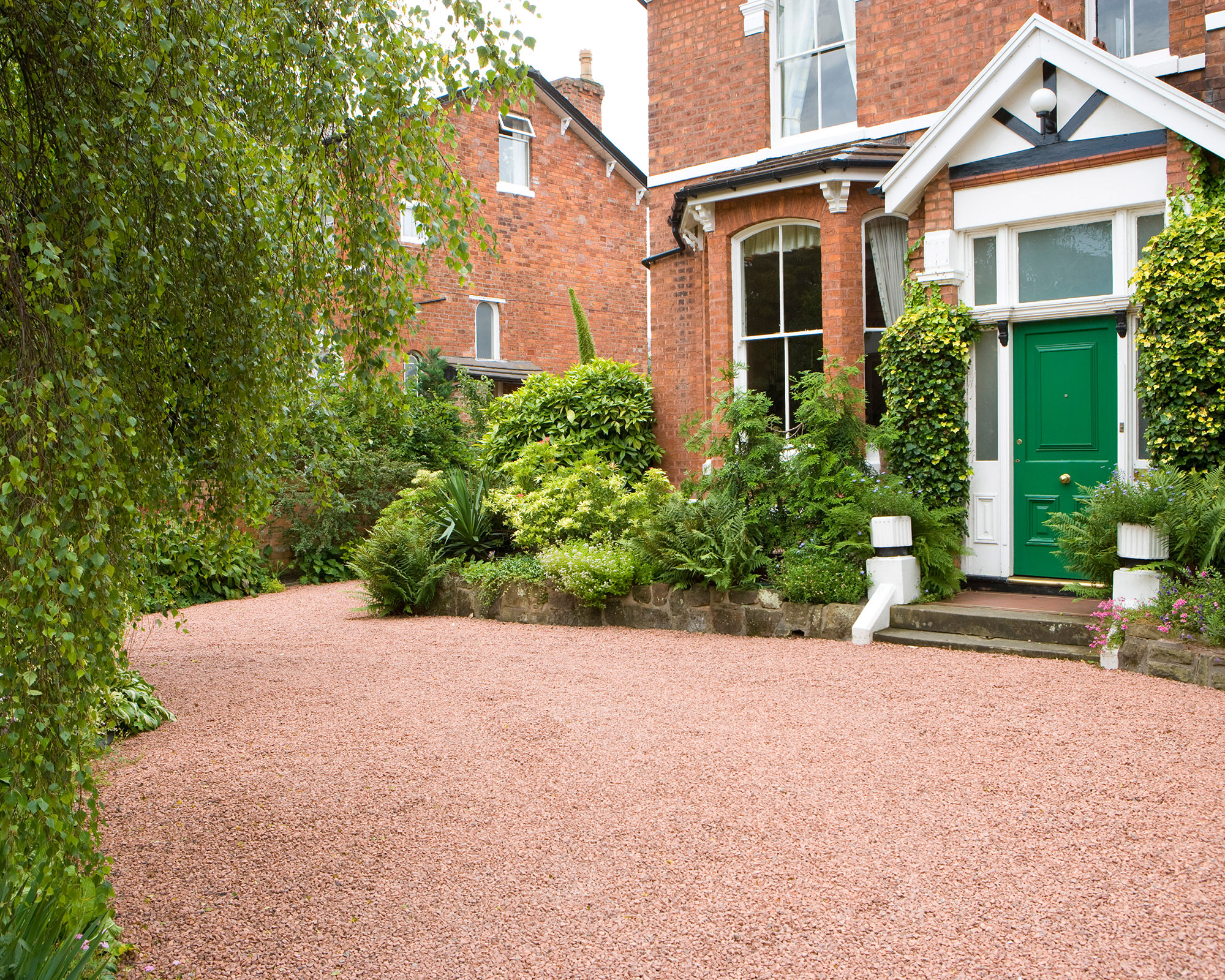
Gravel is one of the more cost-effective driveway materials
What type of driveway lasts longest?
According to Lee Dunderdale, Product Manager at Bradstone, gravel is an extremely durable and cost-effective material. And as long as regularly raked over to remove debris it will last a lifetime.
Concrete also has a lot of longevity. As long as you apply regular sealing, avoid overloading the driveway and repair damaged areas as soon as possible. Given it's price, concrete is a very affordable option considering how long-lasting it is.
Stone cobbled sett driveways will last the longest for driveways which need to withstand a lot of heavy traffic. According to Rowan Cripps of Infinite Paving this is due to their durability and capacity to hold weight without cracking.

Consider your aesthetic when choosing your driveway materials
What type of driveway is best?
This really depends on what your personal considerations are. If you are wanting to use a material which is the most environmentally friendly you'll want to look at natural materials which have good drainage, such as gravel or reinforced grass paving.
For durability stone setts, concrete and gravel are particularly favorable, but most popular driveway materials will have good durability.
If it's aesthetics you're after resin bound pavers come in a good range of colors, as do porcelain tiles and gravel. Stone setts and brick can be arranged to create unique patterns on a driveway.

Teresa has worked as an Editor on a number of gardening magazines for three years now. So she is lucky enough to see and write about gardening across all sizes, budgets and abilities. She recently moved into her first home and the garden is a real project! Currently she is relishing planning her own design and planting schemes. What she is most passionate about when it comes to gardening are the positive effects it has on our mental health to grow and care for plants, as well as being great for the environment too and help provide food and shelter for wildlife.
